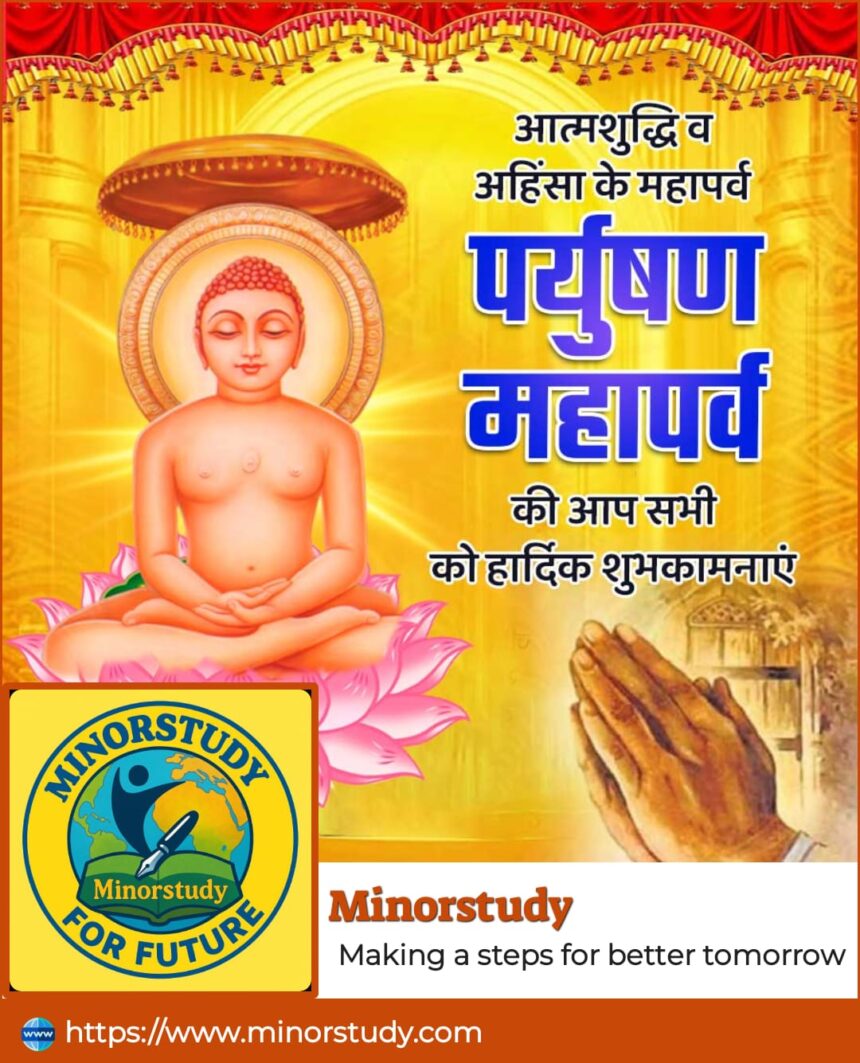Paryushan Mahaparv: History, Facts, Significance, and Life-Changing Insights
Paryushan Mahaparv is the most important and sacred festival in Jainism, celebrated annually with devotion, fasting, meditation, and spiritual reflection. Known as a time of self-purification and forgiveness, it emphasizes the principles of Ahimsa (non-violence), Satya (truth), and Aparigraha (non-possessiveness).
This festival, lasting 8–10 days, is an opportunity for Jains to introspect, seek forgiveness, and strengthen their spiritual resolve. While it is primarily a religious festival, its teachings offer universal lessons for humanity, making it relevant for personal growth and societal harmony.
History of Paryushan Mahaparv
The word “Paryushan” comes from the Sanskrit roots “Pari” (all around) and “Ushan” (to stay), meaning a time to stay close to spiritual practice. Historically, the festival is linked to the Jain Tirthankaras, especially Lord Mahavira, the 24th Tirthankara.
Ancient Origins: References to Paryushan are found in Jain scriptures, emphasizing the importance of fasting, penance, and forgiveness.
Mahavira’s Teachings: Lord Mahavira advocated for intense spiritual reflection and self-discipline, which form the core of Paryushan observances.
Historical Evolution: Over centuries, Paryushan became a structured festival, with specific rituals, discourses, and fasting protocols, uniting the Jain community in spiritual observance.
Paryushan serves as a reminder of the timeless Jain principles and the need for self-purification, moral integrity, and compassion.
Facts About Paryushan Mahaparv
Duration: Paryushan lasts for 8 days for Shvetambar Jains and 10 days for Digambar Jains.
Fasting Tradition: Devotees may undertake partial or complete fasts, ranging from eating only one meal a day to full-day waterless fasts.
Pratikraman Ritual: A central observance involves Pratikraman, a reflective ritual seeking forgiveness for wrongs committed knowingly or unknowingly.
Forgiveness Day (Samvatsari): The last day is called Samvatsari, where Jains seek forgiveness from everyone, saying, “Micchami Dukkadam.”
Scriptural Discourses: Religious discourses from Jain texts are conducted, focusing on Ahimsa, truth, and self-restraint.
Global Celebration: While rooted in India, Paryushan is observed by Jain communities worldwide, emphasizing universal spiritual lessons.
Meditative Practices: Meditation, spiritual reading, and introspection are key components for inner peace.
Community Bonding: Paryushan encourages social harmony and compassion through collective observance and charity.
Timeline of Paryushan Mahaparv
| Day | Rituals and Activities |
|---|---|
| Day 1: Samvatsari Shuddhi | Beginning of spiritual reflection, recitation of Jain scriptures, and fasting. |
| Day 2-7: Observance & Fasting | Devotees perform Pratikraman, attend discourses, meditate, and fast. |
| Day 8-10: Samvatsari (Forgiveness Day) | Seeking forgiveness from family, friends, and community; special prayers and concluding rituals. |
Significance of Paryushan Mahaparv
Paryushan Mahaparv is not merely a ritual; it is a life-transforming spiritual practice with multiple layers of significance:
Spiritual Cleansing: The festival allows individuals to cleanse their mind, body, and soul, promoting self-discipline and purity.
Forgiveness and Compassion: Emphasizes seeking forgiveness and forgiving others, fostering emotional healing and interpersonal harmony.
Promotion of Non-Violence: Encourages Ahimsa in thought, word, and deed, reinforcing ethical living in society.
Self-Reflection: Daily reflection and meditation help identify and correct negative habits, attachments, and impulses.
Family and Community Bonding: Observances bring families and communities together, promoting love, respect, and social unity.
Universal Lessons: Though Jain in origin, the principles of truth, non-violence, and forgiveness are universally applicable.
How to Observe Paryushan Mahaparv
Observing Paryushan Mahaparv requires dedication and awareness. Key practices include:
Fasting: Devotees may choose one or more days of fasting, ranging from partial food abstinence to complete fasts.
Pratikraman: Daily ritual of reflection, confession of wrongs, and reaffirmation of ethical conduct.
Scripture Reading: Reading Jain texts such as Kalpasutra, Tattvartha Sutra, or listening to discourses for guidance.
Meditation: Practicing meditation to calm the mind, remove attachments, and cultivate compassion.
Charity and Kindness: Performing acts of charity, helping the needy, and showing kindness to all beings.
Samvatsari Forgiveness: On the last day, seek forgiveness from everyone, saying Micchami Dukkadam, promoting reconciliation and peace.
FAQs About Paryushan Mahaparv
1. Who should observe Paryushan Mahaparv?
Primarily Jains, but anyone interested in self-purification, meditation, and ethical living can follow its principles.
2. Why is fasting important during Paryushan?
Fasting purifies the body, strengthens self-discipline, and helps focus on spiritual reflection.
3. What is the significance of Micchami Dukkadam?
It is a statement of forgiveness, meaning “If I have caused any harm knowingly or unknowingly, I seek your forgiveness.”
4. Can non-Jains participate in Paryushan?
Yes, the principles of self-reflection, forgiveness, and non-violence are universally beneficial.
5. How long is Paryushan observed?
8 days for Shvetambar Jains and 10 days for Digambar Jains.
6. What are the core teachings emphasized?
Ahimsa (non-violence), Satya (truth), Aparigraha (non-possessiveness), forgiveness, and self-discipline.
7. What is the societal significance of Paryushan?
Promotes harmony, ethical behavior, emotional healing, and community unity.
Impact of Paryushan Mahaparv on Daily Life
Paryushan Mahaparv offers practical lessons for everyday living:
Mindfulness: Regular self-reflection improves decision-making and emotional intelligence.
Forgiveness: Seeking and granting forgiveness reduces grudges and promotes mental peace.
Ethical Living: Encourages honesty, integrity, and compassion in all actions.
Discipline: Fasting and meditation instill self-control, patience, and focus.
Community Bonding: Strengthens relationships with family, friends, and neighbors.
Universal Values: Teaches non-violence, gratitude, and humility, applicable beyond religious boundaries.
Wishing Messages for Paryushan Mahaparv
“May this Paryushan Mahaparv bring spiritual clarity, inner peace, and harmony into your life. Micchami Dukkadam!”
“On this sacred festival, may you find forgiveness, wisdom, and compassion in every aspect of life. Happy Paryushan Mahaparv!”
“Wishing you a life filled with purity, self-discipline, and love for all beings on this Paryushan.”
Conclusion
Paryushan Mahaparv is far more than a religious observance; it is a spiritual journey that teaches the essence of forgiveness, non-violence, and self-discipline. Its teachings transcend religious boundaries, offering lessons for personal growth, ethical living, and societal harmony.
By embracing the principles of Paryushan, individuals can cultivate peace of mind, harmonious relationships, and a compassionate outlook toward all living beings. The festival reinforces the idea that spiritual and moral development are intertwined with societal well-being, making Paryushan a transformative festival with lasting impact.
Key Takeaways:
Paryushan Mahaparv emphasizes Ahimsa, Satya, Aparigraha, and forgiveness.
Observed for 8–10 days with fasting, meditation, and Pratikraman rituals.
Encourages personal reflection, ethical living, and emotional healing.
Promotes family, community, and societal harmony.
Provides universal lessons applicable in everyday life.








